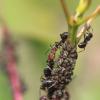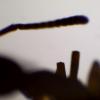Do ants have the issue of sometimes accidentally creating diploid males like bees do? Since their gender determination works similar that should happen.
And how do they deal with them? Do they just eat the eggs/larvae?
Also do they have specific sub-roles like heater ants that go take a sunbath and then warm the brood with infrared emissions from their heated bodies or do the ants this on a basis of individual decision? I know that ants can teach each other (which bees can't really do), so is an ant's career more determined by it's individual abilities than by it's genetic programming?
How do ants react to for example an overheating of the colony? Bee queens mate with lots of different males and the offspring of these males are all sensitive to temperature and humidity in a slightly different way, so the fact that more bees are collecting water has nothing to do with individual decision but genetically programmed behavior (this can actually proven by genetic tests which show that all offspring from a specific male react in exactly the same way when they're the same age) - since most ants only mate once this obviously doesn't work for them. Do ants communicate this via pheromones or do the ants at the entrance register the amount of incoming water-filled cold workers and take this as a sign to either join them or stay in the nest?
And how this work for young colonies where the workers obviously have to decide on their own (unlike bees which are always in a swarm because they multiply by dividing colonies and never by a single queen founding a new nest from scratch)?
I tried to find answers to this but it's really hard to find anything specific in the masses of search results. Most ant pages don't go even remotely that deep.


















